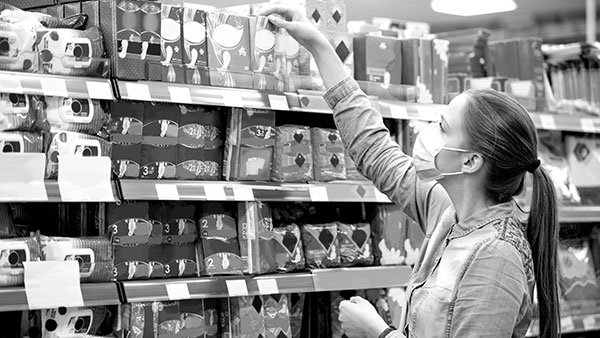Periods don’t stop in a pandemic. As we celebrate International Women’s Day and observe one year living with Covid-19, I spoke with three Fellows leading organisations to address period poverty and gender equality in the UK and beyond.
They provided key insights into their work and reflected on how their organisations have adapted to meet the increased need for period products over the past year.
In March last year, the UK seemed to collectively ask: how could we survive without something as essential as toilet paper? Panic ensued. Photos of bare shelves made headlines and heated debates commenced around hoarding of toilet paper. One of our first lessons of Covid-19 became the severe inequality in people’s access to essential goods.

What didn't make headlines was the bare shelf, perhaps just outside the photo’s frame, emptied of tampons, menstrual cups, and pads.
Pre-pandemic, Plan International reported that 40% of women and girls surveyed used toilet roll because they could not afford period products. Over the past year, toilet paper and period product shortages have made access increasingly difficult, and the scarcity has driven up the unregulated prices of tampons and pads. Schools and government spaces that provided emergency products have also closed.
Women have borne the brunt of Covid-19 in significant ways:
- 9% more women than men live in extreme poverty globally
- Women have less savings and earn less than their male counterparts
- Women make up a much greater portion of the informal economy and hospitality sector
- 70% of essential healthcare workers are women
Period Poverty in the UK
Over the last 10 years, there has been growing awareness of period poverty and how it exacerbates gender inequality in the UK. Driven by grassroots activists, educators, and feminist policymakers, this has resulted in the 2021 abolition of the tampon tax in the UK, and nations like Scotland and New Zealand leading the way to make period products a free good and essential right. It keeps girls out of school, the taboo around menstruation in the UK shames and stigmatises periods, the prohibitive cost of period products limits freedom, mobility, and can negatively impact women's health. To highlight a few key statistics:
- 10% of girls in the UK have been unable to afford period products
- 49% of girls have missed a day of school because of their period
- Menstruators spend a lifetime average of £5,000 on period products
As women have been left economically and socially vulnerable over the last year, Bloody Good Period, a UK charity reported it is now supplying six times as many period products to food banks, homeless shelters, and NHS frontline workers struggling to access these essential items.
Our Fellowship is a global community of 30,000 influential, innovative and diverse changemakers. To understand how we are meeting the needs of menstruators (In this piece, I use the term ‘menstruators’ to acknowledge that not all women menstruate and not all menstruators are women. I also refer to women and girls to reflect language used by organisations and in various reports on gender inequality.) I spoke with three Fellows who lead organisations addressing period poverty, women's empowerment, and education.
Through each of their unique perspectives, I took away insights into the intersections of this issue with economic inequality, the importance of education, and the need for a localised approach to period poverty. This approach exemplifies the RSA’s regenerative futures model, which aims to understand how social and environmental outcomes are deeply connected. An understanding of period poverty at this systemic and interconnected level is key to how these Fellows are envisioning and enacting a more equitable future.
3 Insights on Period Poverty in the Pandemic
1. Period poverty is a consequence of poverty, and BAME women have been most affected
The Zinthiya Trust serves women fleeing violence in Leicester, providing services such as emergency aid, empowerment workshops and unemployment support. Founder Zinthinya Ganeshpanchan FRSA draws a clear connection between this work and the provision of period products - women in poverty are more likely to experience gender-based violence and be unable to afford period products.
The Trust was one of a few NGOs in the area to remain open over the last year, working to provide period products to shelters, food banks, and directly to women who could then distribute them in their communities.
While women have been hit hardest by the pandemic, BAME women have seen the worst financial and psychological impacts. The Zinthiya Trust, serving women in the most ethnically diverse city in the UK, is meeting the needs of women who find themselves increasingly vulnerable and with limited resources and governmental support.
Period poverty is not an isolated issue but rather a need that arises as a result of existing patriarchal and racist power structure. These structures leave women and girls deprived of essential goods and without access to education. Providing period products, Zinthiya stressed, is a life-sustaining bandage on a much deeper wound.
2. Addressing stigma and lack of education are key to alleviating period poverty
Plan International reported that 71% of 14-21 year olds felt embarrassed buying period products. Shame is powerful - it prevents people from feeling comfortable in their bodies, seeking education, and seeing experiences of period poverty as a public health issue.
Janie Hampton FRSA is the Chair of the Menstrual Cup Coalition. They work globally to educate women and girls on the benefits of menstrual cups to address the financial, environmental and health impacts of period poverty.
Menstrual cups are very cost effective and require little water to clean. As opposed to single use pads and tampons, using a cup greatly reduces the amount of waste generated. In the UK alone, approximately 2.5 million tampons and their plastic applicators are flushed down the toilet each day.
However, Janie stressed that knowledge about the cup and how to use it is a significant barrier to the provision of menstrual cups as a more affordable, safer, and environmentally friendly alternative to single-use period products. Education for everyone about available products and women’s bodies is key to reducing the shame and stigma around periods and the promotion of period positivity globally.
3. Responses to period poverty must be localised and adaptive
Freedom4Girls is a small but mighty non-profit in Leeds run by Tina Leslie FRSA. Their mission is to support those who menstruate by challenging the inequalities surrounding menstruation through education, the provision of period products, and advocacy work to end period poverty. They provide a range of period products and education on various products to meet the diverse needs of women and those who mensurate.
Over the past year, they have adapted their ways of working to provide period products during Covid-19. This meant switching from a donation-station based approach to a collection and distribution approach. As the media began to cover how Covid-19 was exacerbating period poverty in the UK, Freedom4Girls took in a surge of period product donations and was able to redistribute them to locations accessible during a pandemic.
Fellows committed to impact
In every conversation I’ve had around period poverty, including my conversations with Zinthiya, Janie and Tina, there is the sharing of a personal memory: how a period left them feeling ashamed, embarrassed, unprepared, or dirty. The details may differ, but these memories serve as a reminder that stigma carries long lasting consequences. However, these memories have served as a catalyst for change in the lives of these three Fellows.
Each of these organisations is a remarkable example of our Fellows’ commitment to impact. These Fellows work, and the three insights highlighted above, exemplify the RSA’s approach to social change and our vision of a world where everyone is able to access a meaningful and purposeful future. They have taken intersectional and flexible responses to serve women and girls during a pandemic. Alleviating period poverty is a pressing challenge of our time, one that paves a powerful pathway to addressing gender equality, environmental justice and racial justice globally.
If you want to connect further with Zinthiya, Janie, and Tina, and our countless inspiring changemakers within our community of Fellows, or the RSA’s work on regenerative futures as we work to address the pressing challenges of our time, consider joining the RSA today.
Related articles
-
Equal, Together: Reflections on International Women’s Day 2020
Blog
Shauna Aaron
Women need to do more, together, by supporting each other in the workplace.
-
International Women's Day 2020
Blog
Martha Glynn
Martha Glynn describes how it appears that we will commence International Women’s Day 2020 aware of both a cause for celebration and the need for accelerated action.
-
A Shadow Pandemic: Covid-19 and Domestic Violence
Comment
Afifa Waheed FRSA
Afifa Waheed FRSA calls for more creative and innovative solutions to help domestic abuse victims during the pandemic.



Join the discussion
Comments
Please login to post a comment or reply
Don't have an account? Click here to register.
Can someone read this article and come away with the idea that a proper means of disposal of tampons and applicators is to flush them down the toilet?Other RSA articles tell of the importance of a focus on the future. Other articles and this one mention the need for better education. The practice of flushing tampons and other plastic items imposes burdens on the future inhabitants of cities by making costly maintenance and repair of sewer systems necessary.Most problems that are described by the word 'poverty' can be made much smaller or eliminated by sharing natural wealth equally. A payment of $45/day to every person would enable people to meet most of their basic needs. (Estimated value of natural resources and services: $45/day/person) Industries should pay fees or be required to buy permits at auction when they take natural resources or put pollution. The proceeds should go to all people. Industries will try to reduce the harm they do to the environment in order to save money. Charging the fees will make prices more honest and will promote sustainability.If we charge tampon-makers for the cost of cleaning the sewers (prorating the charge according to what fraction of the material clogging the pipes is from their factories), they will have an incentive to educate the users of their products about proper disposal.